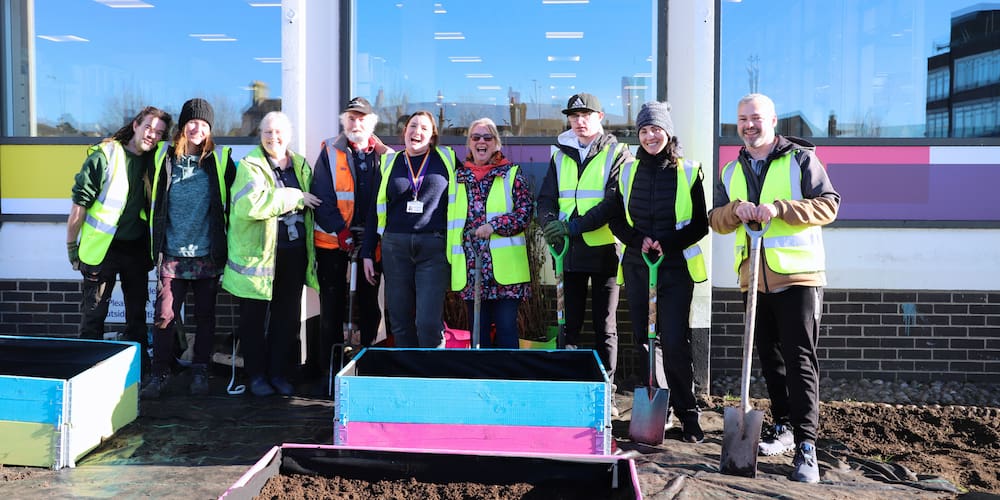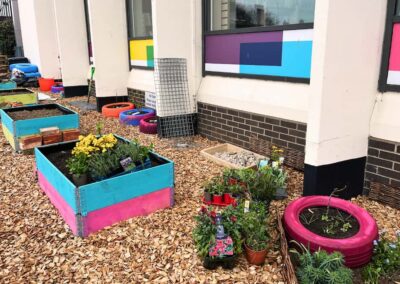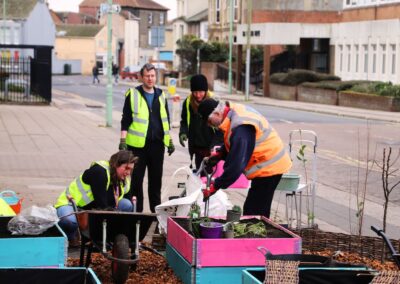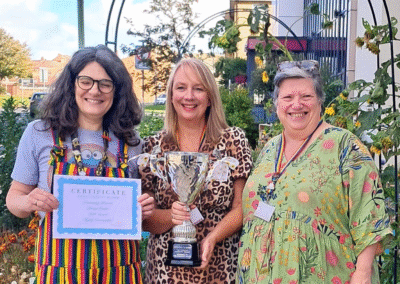By Melissa Matthews | October 28, 2025
To celebrate, we’re reflecting on the project to transform Lowestoft Library’s public garden space which took place in January 2025.
In September 2025, Lowestoft Library won the Lowestoft in Bloom Gold Award for Community Projects.
About the Lowestoft Garden Project
Funded by Culture Nature England, a collaboration between Libraries Connected and Natural England, in January 2025, Lowestoft Library galvanised its community to create a new garden space which would help the library’s community to connect with nature – improving customers health and wellbeing.
Lowestoft is a known area of deprivation ranked among the most deprived 20% in England. The library team wanted the project to help local people who may be struggling to make ends meet to find a way of enjoying nature.
Previous projects have highlighted that food and warmth were a big motivator for customer engagement in Lowestoft so the project focused on growing food in harmony with nature, celebrating the wellbeing benefits nature can brings.
Transforming this vital community space
With support from Suffolk Wildlife Trust and local organic agro-farm Wakelyns, a team of volunteers and library staff turned an unused piece of ground at the front of the library into a thriving garden using people power! Library staff attended Nature Connectedness Training led by Suffolk Wildlife Trust and fed in their ideas for the vision of the community garden.
The community came together on a cold wet weekend in late January and built the bare bones of the garden, painting tyres, shifting soil by the barrow load and planting a wildlife hedge interplanted with fruiting trees.
Throughout the spring the new green space was filled with food for birds and pollinators, to improve the biodiversity of the space and the team interplanted these with high yield produce including but not limited to squash, raspberries and blackcurrants. The idea of the public feeling the need for ‘permission’ to engage with the space was at the forefront of planning and fruit trees were planted near pathways to invite passersby to help themselves to the food growing in the hedgerow. The space also invited people to pause and watch wildlife, so they could engage with nature to support their wellbeing.
Sustainability and reducing costs developing the garden was important. The bulk of the garden’s landscaping was made from upcycled materials including tyres, rubble and machinery packaging. A wildlife pond was created using a broken plastic container and seating in the garden doubled up as bug hotels and homes for wildlife, with an ambition for the garden to provide an insect highway to other green spaces in the town.
Since its creation the garden has flourished with the leadership of library staff and volunteers. The hope is it will pave the way for exploring libraries’ role as a champion of nature for the future, inspiring activities for all ages which encourage curiosity, build confidence and reduce isolation.
Jo Wilde, Lowestoft Library Manager, said:
“This project reflects the heart of what our library stands for – community, learning, and innovation. We can’t wait to see this space transform into something truly special, made by and for the people of Lowestoft.”
Feedback from community volunteers:
- “Lovely to do something positive with a great group of people. Look forward to seeing the garden blossom.”
- “I had an amazing time volunteering in the making of the community garden. Amazing people working together for a great cause. Lowestoft Library is the best library I’ve ever been in, and it offers so much to the local community.”
- “The Lowestoft gardening project has been a fantastic experience. To see so many volunteers turn up to help is inspiring. It’s brilliant for the community and for people’s mental health. The library is a wonderful social hub for the community that provides Lowestoft with so much. It is a joy and a privilege to give back.”
The Lowestoft Garden Project was made possible thanks to funding from Arts Council England and Culture Nature England (Libraries Connected & Natural England).





